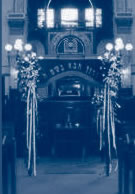| SEDRA : CHUKKAT Hertz Chumash
p. 652 Numbers Chapter 19 \
This week's Sedra is generously sponsored by Sydney Epstein.
SYNOPSIS CHUKKAT:
A special purification ceremony was performed for those who
had been in contact with or had been under the same roof as
a dead body. As part of the rites, a Parah Adumah (Red Heifer)
which was without blemish and which had not been worked was
slaughtered outside the camp and burned together with cedar
wood, hyssop, and a scarlet thread. Its ashes were gathered,
mixed with water from a running stream, and sprinkled upon
the unclean person on the third and seventh days of his impurity.
At the end of the seventh day, after he had washed his clothes
and immersed himself in a mikvah, he could once again participate
in Sanctuary worship.
For thirty-eight years the Israelites wandered throughout
the wilderness, during which time all of the older generation
between twenty and sixty had died except for Joshua and Kalev.
At the beginning of the fortieth year from the Exodus, the
remainder of the populace returned to Kadesh. It was there
that Miriam, the sister of Moses and Aaron, died.
At the passing of Miriam, the well of water that had miraculously
accompanied the Israelites ceased to flow. Once again, the
people began to murmur against Moses for the lack of water.
G-d told Moses and Aaron to speak to a specific rock and enough
water would flow forth from it to satisfy the people.
However, Moses was so angered by the people's constant disrespect
that he impatiently struck the rock instead of speaking to
it. Because they had not followed G-d's instructions and thereby
dishonoured Him before the people, Moses and Aaron were told
that they would not be allowed to enter the Holy Land. The
people were now told to prepare for the final stages of their
long journey.
The only route to the Promised Land that was available to
them was through the land of Edom, south of the Dead Sea.
Moses sent messengers to the King of Edom, requesting permission
to lead the people through his territory and offering to pay
for any water the people and cattle might drink. Not only
did the King refuse, but he also barred the Israelites' way
by threatening them with an armed force.
The Israelites were, therefore, compelled to take the round-about
route by way of the Southern borders of Edom since G-d had
forbidden them to wage war against the Edomites. When the
assembly reached a peak in the range of Hor Hahar, Aaron died
and was buried there. Moses installed Aaron's son Elazar as
the next High Priest.
After successfully repulsing an attack by the Canaanite King
of Arad, the weary Israelites complained bitterly about their
lack of food and water. Consequently, they were punished with
a plague caused by the deadly bite of fiery serpents. When
the people admitted their error, Moshe set a serpent of brass
upon a pole. Whoever looked at this serpent was healed. The
journey, which had taken the nation past the lands of Edom
and Moav, came to a halt when the people reached the river
Arnon, the boundary between Moav in the south and the Amorites
in the north. Sichon, the King of the Amorites, refused to
allow the Israelites to pass through his land and led his
army against them. However, because of G-d's help the battle
ended with the utter defeat of the Amorites. Turning northward
towards the fertile lands of Gilad and Bashan, the Israelites
overcame the resistance of Og, King of Bashan, and took possession
of his country. The land on the east side of the Jordan had
now been conquered and the Israelites finally camped on the
border of Moav, facing Jericho.
HAPHTORAH HERTZ CHUMASH P 682 Micah Chaps. 5,6
Micah speaks out against oppression of the poor by the wealthy,
the dominance of materialism and the lack of true piety in
the cities of Judah and Israel. This would result in the destruction
of the kingdom of Judah in the same way as the kingdom of
Israel had fallen.
Yet, Israel's future destiny will endure despite the lapses
of the generation. His statement regarding the religion of
truth is one of the most sublime ever recorded. "What
does the Lord your G-d require of you, but to do justly to
love mercy and walk humbly with your G-d".
The mention in the Haphtorah of Bilam and his prophecies is
the common theme between the Sedra and the Haphtorah.
TELL ME RABBI ..... THE THREE WEEKS
The twenty-one days between Tammuz 17 and Tish'ah B'Av are
called "Yeme Ben Hametzarim" (The Days of Difficult
Straits), as described in the Book of Lamentations (13), "...all
her persecutors overtook her between the straits."
Historically this period has seen numerous catastrophes which
have befallen the Jewish people. We therefore limit all forms
of rejoicing, and mourn the destruction of the First and Second
Holy Temples which were both set to flame in this period.
The intensity of mourning practices steadily increases from
the Fast of 17th Tammuz to reach its peak on Tish'ah B'Av
itself, when even the most basic pleasures such as washing,
anointing, eating and drinking are forbidden.
Although it is customary not to hold weddings during the
Three Weeks, engagements, meals in honour of a bris or pidyon
haben are permitted but without music or dancing
We avoid saying the blessing 'Shehecheyanu' during the Three
Weeks in most cases so it is customary not to wear new clothes.
Because of the many major tragedies that occurred in this
period, we are especially careful of entering into situations
which may result in bodily harm.
It is also usual to avoid litigation during this period as
it is considered an inauspicious time.
We do not take a haircut or trim the beard during the Three
Weeks.
During the first 9 days of Av we do not eat meat or drink
wine except on Shabbat since from this time all sacrifices
in the Temple ceased. The Fast of Tammuz is on Thursday 4th
July (dawn to dusk).
This is one of the four fasts ordained by the prophets to
commemorate tragic historic events (Zechariah 8:19).
Five tragedies befell the Jewish people on this date:
Moses smashed the original tablets of G-d's covenant;
the daily sacrifice was suspended in the First Temple due
to a lack of sacrificial animals;
Apostamos, an officer of the wicked Antiochus, burnt of Torah
scroll;
a heathen idol was brought into the Temple compound;
the walls of Jerusalem were breached by Titus' army ending
in the destruction of the Second Temple.
BACK TO SHABBAT SHALOM
TABLE
|








